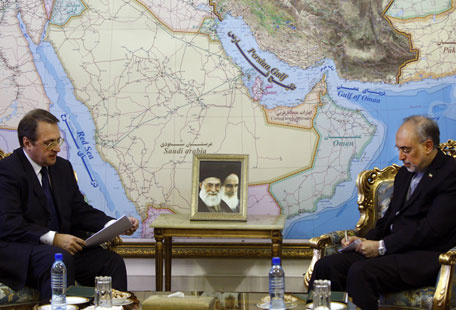Russia Striving to Keep Its Last Middle East Footholds

IRD: Moscow and Tehran host Iranian and Russian officials these days to ease the pressures on Iran via mutual cooperation. With the recent opportunities in Syria, Russia feels it is on the receiving end of the West’s approach in the Syrian game, and is thus trying to maintain its remaining footholds in the Middle East. IRD reviews the issue in an interview with Mahmoud Shouri:
IRD: We are witnessing frequent diplomatic visits between Iranian and Russian officials in the recent days. How worried is Russia about the anti-Iran atmosphere created by the West, and how is this influencing its current policies?
MS: Well, the Russians’ reaction against Amano’s report indicates their serious concern with the path the West is following via the IAEA report about Iran’s nuclear program. Moscow’s reaction has been unprecedented. The Deputy Secretary of Iran's Supreme National Security Council met the Russian Minister of Foreign Affairs Sergei Lavrov on Sunday, and Lavrov’s deputy visited Iran recently to negotiate with Iran's Foreign Minister.
The statement the Russian Ministry of Foreign Affairs released in response to Amano’s report may be another signal. In the statement, the Russians compared the report to the allegations of Iraq possessing WMDs, which provided the pretext for Washington to attack the country; the present report can also be a mere excuse to further pressurize Iran. Russia regards the report as a measure to lay the groundwork for taking more stringent measures against Iran. But they do not want any stronger actions or military operation against Iran due to regional circumstances.
IRD: Could Moscow’s position affect the international community’s behavior vis-à-vis Iran?
MS: In the current situation, unfortunately, the Islamic Republic of Iran does not have adequate international leverage to prove its claims and to protect its rights in the international arena. The Russians, as a veto-wielding member of the UN Security Council, can show effective support for Iran, preventing the formation of an international consensus against Iran and providing a channel other than Iran’s formal ones to transfer Tehran’s concerns regarding the hidden dimensions of the report. In addition, the US needs the Security Council’s consent to take harsher measures against Iran, and Moscow can impede Washington’s efforts. However, it cannot be said with certainty that Russia and the West will not come to a final agreement. It is possible that they will agree upon a certain degree of sanctions against Iran; nonetheless, to a certain extent, the Russians can be an obstacle against the unilateral actions of the US.
IRD: Seemingly, Russia is trying to resolve the nuclear dispute through the launching of a step-by-step scheme. Foreign Minister Lavrov stated that Iran was ready to settle the dispute via negotiations. As you know, the negotiations between Iran and the Five plus One have not been successful. Is any tool available to Russia to press both parties –Iran and the West- to reconcile?
MS: Holding successful negotiations and preventing further biting sanctions against Iran are two different stories. Moscow is currently concentrating its efforts to realize the latter, that is, to stifle the backbreaking pressure on Iran in order to maintain the regional balance. Perhaps negotiations come into play as the next step, as the Russians think that offering meaningful incentives to Iran will finally make the negotiations productive.
IRD: The Western countries have not adopted any specific position regarding the step-by-step initiative of Russia. Even the French ambassador to Iran has claimed that it was not proposed in coordination with the Five plus One. In your opinion, will the West accept negotiations based on Moscow’s plan?
MS: With Amano’s recent report, it seems that the Western countries are following their own preferred way, not heeding the Russian step-by-step scheme as they try to maximize pressure on Iran. Israel and its lobbies have been very effective in this regard. If Western diplomats were the ultimate decision-makers, the possibility of negotiations could become stronger, but the pro-Israel lobbies reject the prospect of a nuclear Iran. Moscow’s plan will be considered by the West if the situation changes, or the pressures prove ineffective.

